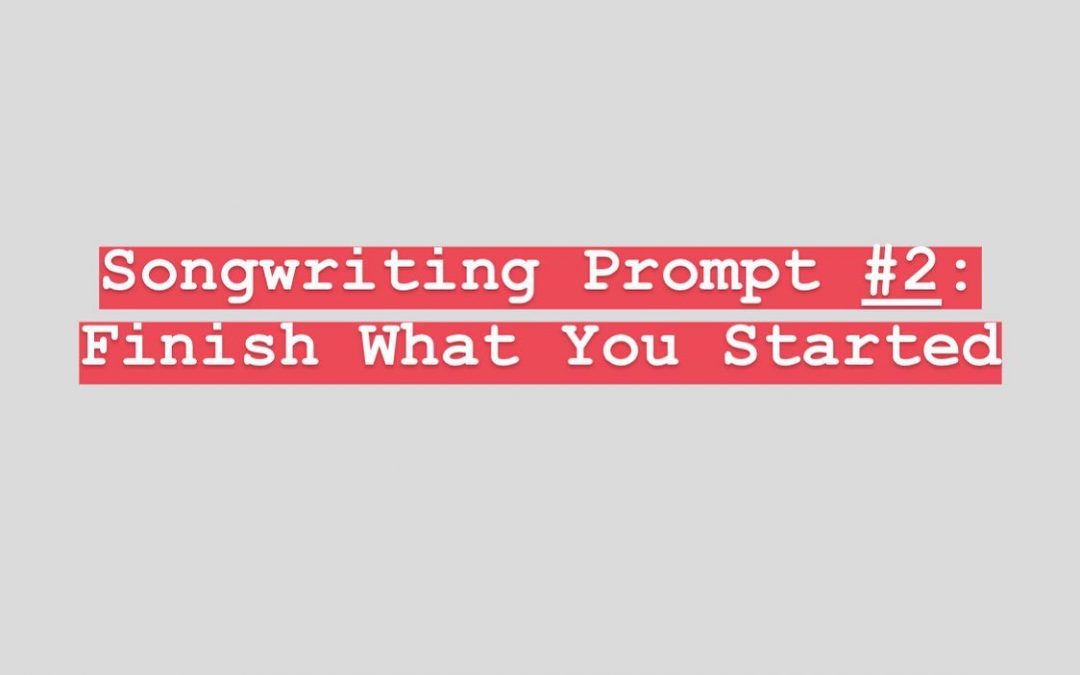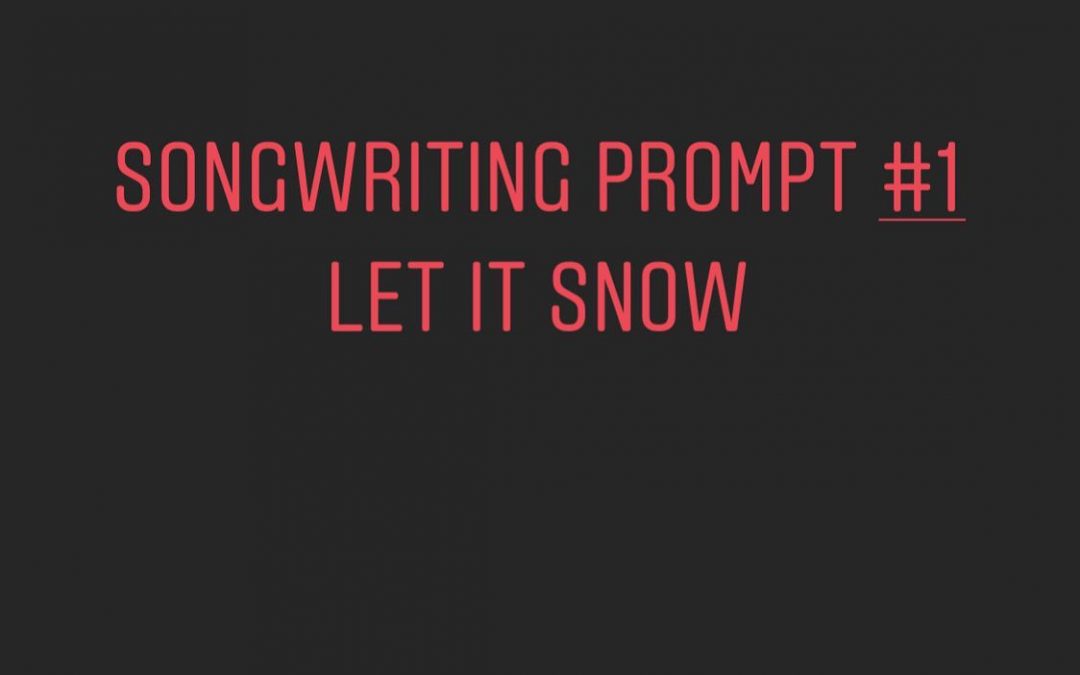
by Mike Errico | Apr 22, 2020 | Lessons, Teaching
SONGWRITING PROMPT TWO: FINISH WHAT YOU STARTED So much taking stock going on out here. So much reassessing. So many projects put off for a thousand years finally getting done. I think it’s time to open up that “UNFINISHED SONG” folder and just…listen. Maybe some time has passed and you can hear the tracks a little differently. Maybe two of them are really parts of one song you conceived at different moments. Maybe it’s time to stitch them together, finally. So: Sit back and listen to what you have, and move one (or more) of them to the “FINISHED SONG”...

by Mike Errico | Apr 17, 2020 | Lessons, Teaching
Some students asked for songwriting prompts to get them through this time and keep them inspired. I’m going to add them here, hoping they help you, too. NOTE: They don’t have to be for songs. I’m sure you can apply them to other creative projects. SONGWRITING PROMPT ONE: I’ve always loved the fact that Sammy Cahn and Jule Styne wrote the classic “Let it Snow” in the middle of a hot July summer. The song provided what their actual circumstances did not. (Snow.) I’m hearing some you are writing songs that reflect our current reality, which is great, but what if you could provide what our actual circumstances do not? We’re isolated; write about being together. We’re freaked out; write about resilience, or confidence, or add some anger and write about defiance. I’m not talking about drugging us with sunshine and rainbows, or living in denial of what’s going on. I’m talking about putting yourself in the listener’s place and thinking about what they need from you as a creator. It’s probably not news headlines, and maybe not a mirror to the moment, either. They’re getting plenty of that. This prompt is about providing them with a tool they need to see past it. So: Sammy Cahn and Jule Styne made it snow in July. What’s our version of that? THAT. Write that. Feel free to post drafts, if you like. I hope you’re all...

by Mike Errico | Oct 14, 2015 | Lessons, Teaching
Thanks to Ben Mink and Michael Beinhorn, brilliant producers who came to my class at NYU’s Clive Davis Institute to discuss their creative roles in the recording process. Michael told us how he had to send Soundgarden home to write more songs, pushing them to a career high with Superunkown. Ben played us traditional klezmer music, which influenced him early on, and drew a direct line to the chorus of kd lang’s hit, “Constant Craving,” which was then co-opted by the Rolling Stones in their song, “Anybody Seen My Baby?” It pained me to tell them we were out of time. Ben Mink http://www.benmink.com Ben Mink’s wide range of recording collaborations includes Feist, k.d. lang, Rush, Alison Krauss, Daniel Lanois, Roy Orbison, Elton John, Heart, the Klezmatics, Wynona Judd, Method Man, and many more. He has been nominated for nine Grammies, winning twice for his work with k.d. lang. In 2007, he was co-nominated for his work on Feist’s 1234, which gained global popularity in the rollout campaign for the iPod Nano. In 2011, the TV series Glee used Ben’s composition “Constant Craving,” performed by Chris Colfer, Idina Menzel and Naya Rivera. Mink has lectured on such topics as “The Music Business vs. the Creative Process,” at the University of British Columbia, Western Washington University and Simon Fraser University. He has also worked with students as an associate of UBC’s Department of Mechanical Engineering (robotics) and is an associate member of the Institute for Computing, Information & Cognitive Systems. Michael Beinhorn http://michaelbeinhorn.com/ Michael Beinhorn’s production has played a primary role in creating career-defining records for artists including Marilyn Manson,...

by Mike Errico | Apr 1, 2015 | Lessons, Text Journalism
“It is not the strongest or the most intelligent who will survive but those who can best manage change.” — Charles Darwin I’m used to managing change, and if you’re reading this, I bet you are, too. My short story: My label debut was released in 1999, and my coming out party was a slot at Woodstock ’99, which, you may recall, went up in flames and took the legacy of a previous era with it. ‘99 was the summer of Napster, and the winter of Y2K…and it only got weirder from there. Luckily, improvisation has always been part of the job description. Today is no different, and though there are new challenges, there is also the same Darwinian need to adapt. As a songwriting professor who’s been in the trenches, I tell my students that my class – The Art and Business of Songwriting – is the most important one they’re taking. They laugh, but I remind them: The song is the spark for the chain reaction that ignites every subsequent section of the industry. The song gets the musicians paid, the studios booked, the promoters on the phone, the venues filled, the PROs collecting royalties, and straight on down the line. Songwriting is also the creation of intellectual property that can continue to generate income over time. I tell them that the people who say “touring is the answer” for musicians are likely people who a) have never toured themselves, and b) forget the fact that human bodies inevitably fail over time, whereas there are songwriters out there making a great living who aren’t even...

by Mike Errico | Mar 18, 2015 | Lessons, Teaching, Text Journalism, The Solo Show
This is not about copyright infringement. It’s about how not to get effed by your own entertainment lawyer. I hope my artist friends will check it out, and I hope it helps. What the “Blurred Lines” Lawyer Taught All Artists For a minute, forget about the “Blurred Lines” verdict, the lyrics and whether or not you love Marvin Gaye. The New York Times just ran a profile on Richard S. Busch, the lawyer who won the $7.4 million case for the Gaye estate. In explaining how he did it, Busch says something I hope all artists caught: “By being on the outside,” he said, “everyone who hires me knows that they get 100 percent of my loyalty.” Why is that noteworthy? Because there’s an assumption that you can hire an entertainment attorney — that’s the guy on your side, remember — and not get 100 percent of his/her loyalty. It’s pretty hard to win a legal battle with a lawyer who might not be riding with you. You’d think loyalty was a given, but, as Busch casually explains it, that’s not the case. Read on at Cuepoint. What the “Blurred Lines” Lawyer Taught All...

by Mike Errico | Feb 20, 2015 | audio, Lessons, live shows, Stories, Teaching
I’ll be doing this on Saturday. Amazing lineup. I’m honored to have been included. My contribution is “Dancing About Architecture” – the interplay between sound, architecture, composition and meaning. I’ll be talking, playing, and spinning J.S. Bach, AC/DC and FKA Twigs. Despite that, I’m fairly sure it will make sense. The SVA Theatre is located at 333 W. 23rd street, between 8th and 9th avenues. Directions can be found at svatheatre.com tix: http://www.eventbrite.com/e/what-design-sounds-like-tickets… Tweets at #WDSL For more about Design Observer:...







